Mary Fleming's Blog, page 5
September 3, 2022
The Light in August
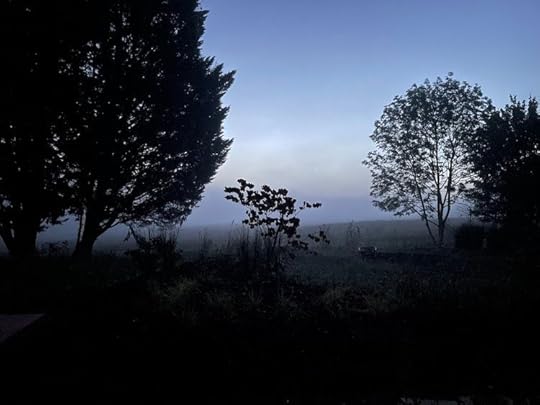
Friday, 2 September
Most years, I watch the light in August with a tinge of regret, a pinch of anticipated nostalgia. The days are getting noticeably shorter. Evenings, out come the candles by supper's end. Mornings, I wake, make my coffee and get down to work in the dark. With summer on the wane, the rentrée stress of September, I know, lies just ahead.
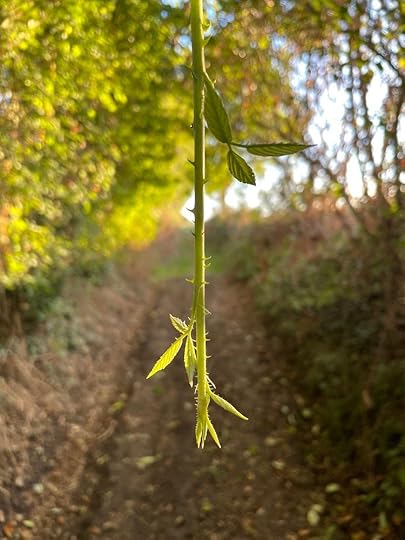
But not this year. This year I have rejoiced at every nano-second of increased darkness. Or more accurately, decreased daylight, i.e., less time for the sun to beat down on the parched earth and heat the air to such a degree (regularly between 35-38C/95-100F) that our front door handle is too hot to touch. Less time for the sun to torture exhausted, extenuated trees that have shed leaves months in advance in order to conserve their already depleted energy...
 Bike riding
Bike riding...and to render indefatigable dogs phlegmatic (silver lining there)...
 Too hot for hunting
Too hot for huntingAs for humans, indefatigable I may not be, but even a modicum of mental or physical energy was at times hard to summon.
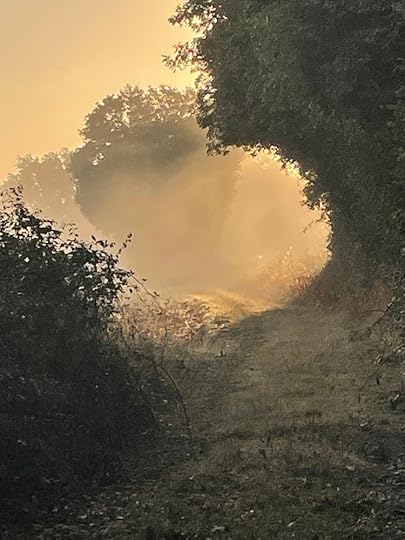
France has been 2.3°C/6°F hotter than average (a metric that must mean less and less as one hot summer outdoes the last), and at least 25% drier, after a winter-spring that was 33% short on precipitation. Much of the rain that did fall came in violent storms that caused almost as much harm as relief.
 Assessing the damage - the experts weigh in
Assessing the damage - the experts weigh inLes Français have been so shocked by the unbearable heat, raging forest fires, depleted waterways and violent storms of the last three months that they now rank climate change number two on their list of worries. As regular readers already know, I would put it ahead of the current number one, purchasing power. In fact, the daily reminders of our increasingly inhospitable environment make it hard to write about much else.
Certainly my fixation this summer has been aggravated by the state of our garden.
Now, I know in my last posting I promised "(positive! upbeat!) news" on that front, but the long-delayed delivery of terrace stones meant landscaping (except for the odd patch, such as what Tasha has appropriated above) wasn't finished until late July, at which point it was too hot and dry to plant or seed. The raw earth around the house all too easily evoked in my mind a larger, planetary version of desolation.
 Foreboding
ForebodingAt least, I learned last week from an article in Le Parisien, I am not alone. Enough other people suffer from similar episodes of climate change distress that there's now a term for it: eco-anxiety. Further internet research revealed a multitude of sites devoted to the subject. Wikipedia defines its victims as those for whom there is a "generalised sense that the ecological foundations of existence are in the process of collapse." That would be me.
Another site, ecoanxiety.com, suggests ways to manage your angst "if it's getting out of hand". One is engaging with nature herself, and as I have also previously noted, I know of no more effective miracle drug.
 Resourcing
ResourcingThis summer's treatment has included getting better acquainted with our local avian population. The pair of buzzards that live in the woods and call irascibly to one another from high in the sky. The two peacocks who do the same on ground level. The family of kestrels that live in the niche that used be the opening to be the pigeonnier in our house.
 Hidden treasure
Hidden treasureAnd the swallows! I don't know where they've been living since we kicked them out of the barn, but a host returned in August to swoop and feast on the bugs buzzing about our now organic fields. Then yesterday, as if they'd heard the Ministère de l'Education calling them back to school for la rentrée des classes, they were gone.
By my rant against the dry heat, I do not mean to dis the sun entirely. It has been behind some spectacular skies...
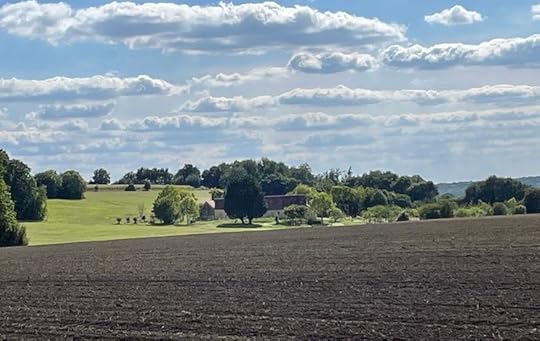 Home looking sweet
Home looking sweet...and presented the ochre Perche stone in its best light...
 Church corners, St Cyr la Rosière
Church corners, St Cyr la RosièreIt has ripened, albeit weeks too early, the delicious blackberries that have considerably slowed our recent morning walks...
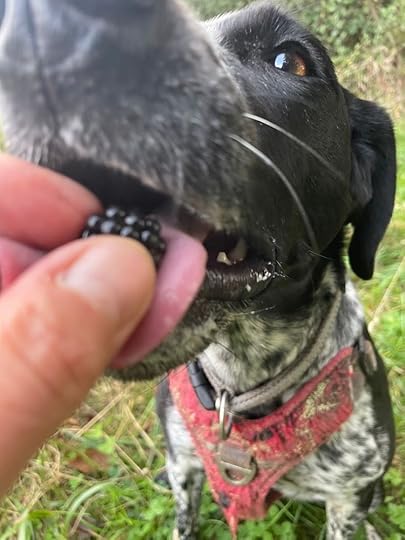
Ecoanxiety.com also advises "spending time with other people", and we did just that, with new Perche pals and visits from old friends and family - not all of whom seemed bothered by the bare earth.
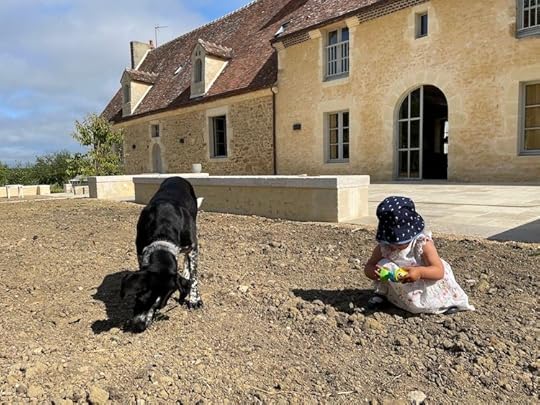
But the heat thrummed through the days and left a purgatorial sense of time standing still, of being stuck in an inescapable torpor. So when France returned to work on a cool Monday morning this week, it was like an injection of life serum. Rather than back-to-school angst, I felt recharged and renewed, edgier and lighter in mind and body.
All that was needed - rain - fell in benevolent abundance this morning.
 Kinder light at the end of the rainy tunnel?
Kinder light at the end of the rainy tunnel?Let the planting begin.
___________________
July 16, 2022
Attempted Getaway, II

Friday, 15 July
To prevent my Paris-Perche Diary from becoming a cahier de doléances, the register of complaints presented by citizens to the king during national assemblies of the Ancien Régime, I did not write a blog last week as planned. The list of minor misfortunes I enumerated in Best Laid Plans had only grown longer (more vacuum cleaner problems, another puncture—bike this time—and—the topper—arrival in Paris on a quick trip to pick up our art that has been stacked and stored since Berlin to find our courtyard inaccessible).
 Communal space?
Communal space?I hoped that another week and some time away might reset our luck button, give me something positive to report.
Tuesday, July 12th was our 25th wedding anniversary—not that long given our over-ripening ages, but we are second-timers—and we’d decided to celebrate with a two-day trip to the Cotentin, a region that people kept telling us to visit.
 Cosy Cotentin agriculture
Cosy Cotentin agricultureIn the Perche, we are at the southern end of Normandy; le Cotentin forms its northernmost extremity, a peninsula that sticks out thumb-like, into the English Channel. Besides a lot of coastline, the region is very rural, a patchwork of small fields, the way much of France used to look, until big agriculture ploughed in 70 years ago and destroyed two-thirds of the hedgerows (including in the Perche, though the survival rate here is relatively high). A time warp, I thought, was just what we needed, and it was about time that Tasha saw the sea.
 What the hell is this?
What the hell is this?We found a sweet hotel in Port Racine, near the tip.
[image error]We had long walks along the coast...

...and inland amidst the deep purple heather.
 No deer here
No deer hereAnd of course we brought Tasha to the beach. Ever since she took a flying leap into the Seine after a family of ducks two weeks into her life with us, she has had a complicated relationship with water. For a long time she even avoided puddles, but she has regained confidence over the years.
At first she was hesitant…

…then she tried to be brave…

...but thought better of it...

…and settled for the baby (tidal) pool.

Along our route, we admired the old stone architecture, with its austere lines...
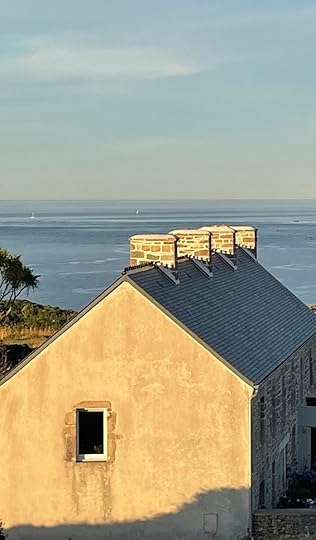
...and the light that inspired the Cotentin-born painter Jean-François Millet.
 Framed Millet
Framed MilletBut as I have recently noted, you can only get away from it all up to a point. In Europe, you'll always be reminded of the past. In this case, of the close if fraught relationship between Britain and France through the ages. Right off the coast of the Cotentin are the Channel islands, les Iles Anglo-Normandes to the French. To quote Wikipedia on their status: "They have been parts of the Duchy of Normandy since the tenth century, and Queen Elizabeth II is often referred to by her traditional and conventional title of Duke of Normandy. However, pursuant to the Treaty of Paris (1259), she governs in her right as The Queen (the "Crown in right of Jersey")."
In practical terms, this Byzantine arrangement meant that as we were walking the western shore, my phone pinged and welcomed me to the United Kingdom.
Then there's the long and often troubled history with another neighbour, Germany. Given the proximity to England, the Germans heavily fortified the coastline during World War II. The concrete bunkers are everywhere, and though I've seen many before, today the mind leaps easily from their sinister remnants to Ukraine and Russia.
 Scars of history
Scars of historyAs for the present, smack in the middle of the bucolic bliss described above are a nuclear waste treatment station and a nuclear waste storage plant for the nuclear reactor 20kms/12miles to the south in Flamanville. The waste sites dominate the landscape at the entire top of the peninsula, making it almost impossible not to see some part of their sprawl wherever you go.
 Background waste
Background wasteDriving by the triply fenced area is like landing at the arch villain’s complex in a James Bond film. Except it's not a movie and it's very scary. There were protest signs in every village "Stop, à la piscine nucléaire !" against a project to build yet another waste facility, a spent fuel pool, in the area. Think what you may about nuclear power, such a complex begs some questions, like how "clean" is the source of 75% of France's energy, and how will we ever manage our insatiable energy needs?
With the sun, you might well answer. For now, however, its heat rendered our gorgeous walks almost unbearable. The canicule that has settled over France will ease next week, but there's not a drop of rain in sight for the foreseeable future.
 Hot, very hot - did you say this was called the Mediterranean?
Hot, very hot - did you say this was called the Mediterranean?But here I am again, if not complaining then fretting (the Latin root of doléance is dolere, to regret, lament, suffer).
It was a good, glitch-free trip, and we returned revitalised to the Perche, where lots of progress on our garden had been made. Rendez-vous in September for more (positive! upbeat!) news on that.
 Sneak preview
Sneak previewIn the meantime, wishing you all a happy and restorative summer.
___________________
June 25, 2022
Best Laid Plans
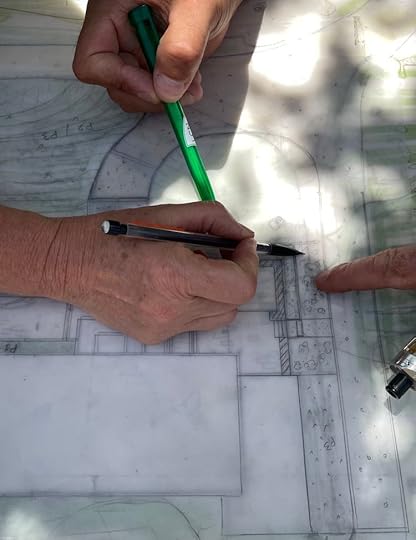
Friday, 24 June
The past week has left my mind softened and scrambled, and whether or not it's up to telling you about it today, we’ll see.
First, let's back up a bit. You may remember that in April I declared our house works in the Perche, except for the odd job or two, 'finished'. Well, that was the inside. The outside has been languishing, raw and messy, for what seems forever.

The plan was that while the terraces were being laid in the front of the house, the landscaping and gardening would be done out back. By the time the masons had finished, the terrassiers* could segue to the front and presto, we'd have a finished product, inside and out.
The last weeks, there has been a collective tapping of fingers on the table (architects, masons, terrassiers, gardeners and us) while we waited for the necessary stones to launch the work. The quarry in the Périgord dangled delivery dates like grapes before Tantalus, until finally, last week, the stones really were in the mail.
Garden prep behind the house got underway. Weeds, along with stray oats, beans and clover from the fields, had grown up everywhere, and the ground needed a pre-op chop...
 Samuel first
Samuel first...and rake.
 Louison in his wake
Louison in his wakeMonday, Patrice our bio farmer pulled up in his tractor...

...and delivered 25 tonnes of Good Earth...

Tuesday the masons...

...Claire and the terrassiers...
 Team work
Team work...got started.
All the stars aligned, right?
As we were getting ready for bed Tuesday night, a ferocious storm moved over Deux Champs, striking us with lightening (CRACK-PANG!). The internet, which had just been restored after damage from another storm six weeks ago, went out. Amazingly, some of the electricity (the fridge!) held on.
Wednesday morning everyone was back at work, including, coincidentally, the artisans for our residual indoor projects. The carpenters put in shutters to keep out some of the increasingly unbearable summer heat (last weekend the thermometer reached a mind-melting 38°C/100°F, even before it was officially summer). And the metal workers made a new banister for the staircase.
 What was wrong, really, with the old one?
What was wrong, really, with the old one?Between the masons, carpenters, metal workers and terrassiers moving about and using their machines inside and out, I’ll let you imagine the general level of thought-preventive disturbance.
Wednesday afternoon, partly to get away from it all, I drove half an hour to Mortagne to buy a new vacuum cleaner - for some reason the motor on our relatively new one has died - and while parking, I bumped into an iron fixture on the curb and punctured the tire. A nice young man offered to help me change it...until we opened up the back and determined there was no spare (a vague memory of a mechanic telling us he'd taken it out - "they're heavy and you hardly ever need one" - returned to me). Lots of waiting ensued: for the insurance company to answer the phone, for a tow truck to arrive and take me to a nearby garage, for a ride home.
That evening, having left their job unfinished the previous night, the heavens let loose again with diluvial force and out went the electricity altogether.
We went to bed with no power, no internet, no car and low morale.
 Overnight pond creation
Overnight pond creationYesterday, Thursday, began with the above-mentioned workers, plus their bosses, plus the architect, plus the electrician, who thankfully found the source of the power outage and got most of the electricity back on. They say it takes a village; in our case the more appropriate administrative designation might be town.
 One, two, three...oh, forget it. There are too many of you.
One, two, three...oh, forget it. There are too many of you.Enter the telecom technician, who discovered that the lightning had actually struck a hedge through which our cable passed, thus sizzling the wire all the way to the house.
 Culprit conduit
Culprit conduit The cable could not be repaired, he said, until the stretch of foliage - a mere 60 metres/200 feet of densely packed fruit trees - was trimmed.
Yesterday afternoon (by now Tasha had run off too) walking away from the house in search of reception (phone and broadband in the whole area had been disturbed by the storm) and transport back to the garage, I wondered why we'd launched this huge project in the first place. The disruptions never seem to end, and beyond the storm-induced damage, there were a host of other annoyances from the car to the broken vacuum to an incapacitated kitchen sink to a multi-front invasion of seemingly indestructible ants (some in our bed) . I know that sorrows - nano or otherwise - come in battalions, but after a while, don't you have to read something into the signs?
I headed up the lane on foot to meet the taxi (the vehicle doubles as an ambulance; at this point it was unclear which service I needed more) because the terrassiers, God bless them, were already at work trimming the hedge (and it's now too muddy for the big machines in the back garden anyway). Who knows when we’ll get reconnected, but in the meantime, God should also bless the hotspot from which I write this blog.
 Only 50 metres to go
Only 50 metres to goBy evening, hedge trimmed, dog and car home, our neighbour Jean-Pierre arrived bearing raspberries from his garden, a guide to renovating old houses in the region (ha!) and a micro-history of the Perche. We sat on the (almost finished) back terrace with a glass of crémant, overlooking the recently harvested field. The conviviality and the stillness brought me half back to my senses.

On the one hand, last week highlighted how mildly, really, lives like mine are usually inconvenienced. On the other, it offered a glimpse at how much more frequently and seriously they may be disrupted in our climately changed world.

In any case, Dear Readers, apologies: reports on our finished project were greatly exaggerated.
_____________
*I’m going to use the French word because I can’t find an appellation in English that captures the combination of brute force and fine touch that these professionals demonstrate when moving earth.
June 11, 2022
Not My Kind of Music
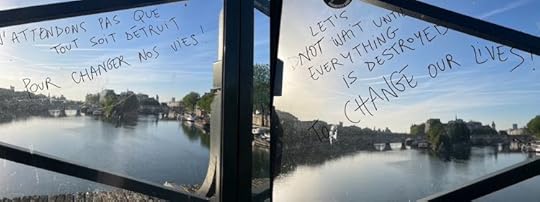
Friday, 10 June
Right now, this early morning, all I can hear through the open window is a pair of cooing wood pigeons and the faint, intermittent din of traffic on the boulevard Saint Germain.
But in the next hours, the noise will ratchet up, be close to unbearable by lunch.
It’s hard to write convincingly about sound, since it’s the ears and nervous system that take a hit, rather than the eyes and the mind. For the same reason, sound is not easy to evoke with photographs. But here goes.
The first assault to my ears occurs on the way to the Tuileries. A few years ago, people started boxing in the morning under the pont de Solférino. The bam, bam, bam, pow, pow, pow under our feet makes Tasha’s ears flatten and my shoulders jump.
 Ouch
OuchSometime in the middle of breakfast, the construction project on the hôtel particulier in our courtyard that I’ve already written about and that is still nowhere near finished…
 Nothing beats the elegance of Paris' 7e arrondissement living
Nothing beats the elegance of Paris' 7e arrondissement living...starts tuning up.
Ditto for the work site across the street at the former Ministry of Defence...
 Between church and state
Between church and state...and, for the last couple of weeks, the one on the boulevard St Germain.
 Where's a dog to go?
Where's a dog to go? By the time I’m up in my office, it’s a John Cage symphony, heavy on the percussion: the drills syncopated and in stereo, the hammers booming contrapuntally from across the street. The string section (metal saw) whines mezzo out back. Enter fortissimo the sirens that constantly screech, howl and keen down the boulevard St Germain, pitched like a mega-piccolo.
Those I can hear going by now, at 10am, are likely to be the cavalcade of motorcycles and penitentiary vehicles taking the defendants in the 13 novembre terrorist trial to the Palais de Justice, near Notre Dame. For the last nine months, they have blared by me on Thursdays while I wait for Tasha to be picked up for her weekly outing with Koffi & Cie, and it chills me to the bone every time.
 The terrorist trail
The terrorist trailNow, I admit that my ears are particularly (overly, my husband might say) sensitive to noise. Loud chewing, for example, drives me to distraction, and I cannot be in the same room when someone else is typing on a computer. But hearing does not improve with age, so if Paris is bothering me more, the reason must be that the city is noisier than it used to be. For a while, I thought it was just my quartier. These last two weeks, however, biking here and there to various meetings, I've found it’s everywhere the same: major construction noise, ceaseless sirens and drivers hooting like Italians.
Furthermore: “People are getting louder,” says my friend Nathaële, who lives in the lively Bobo quartier around the rue des Martyrs. “When I walk the dog past restaurants in the evening, voices boom from the restaurants, often over blasting music.” There’s a general sense of heightened, feverish agitation, she says. “It’s worse than the schoolyard.”
Since we have recently experienced that very phenomenon in a restaurant (in the boring 7ème, no less) that we used to like for its hushed timbre, I believe her.
Should you remain unconvinced that the plural of anecdote is data, take a look at the study published by money.co.uk late last year on the noisiest cities in Europe. Guess what? Paris was Top of the Pops. Among the contributing factors: "crowds packing into bars and terraces."
The other day I went to a medical centre for some tests and saw this sign taped all over the place:
 Clinical violence
Clinical violenceIt warns people that aggressive behaviour against the medical or administrative staff can be prosecuted. It reminded me of the sign that flashed up every five minutes during a Eurostar trip earlier this year.

Lately I've been wondering if the rising noise level and the increase in incivility and hostility aren't related. Is the boxing under the bridge, for example, a healthy sign of stress release or a worrying indication of building belligerence?
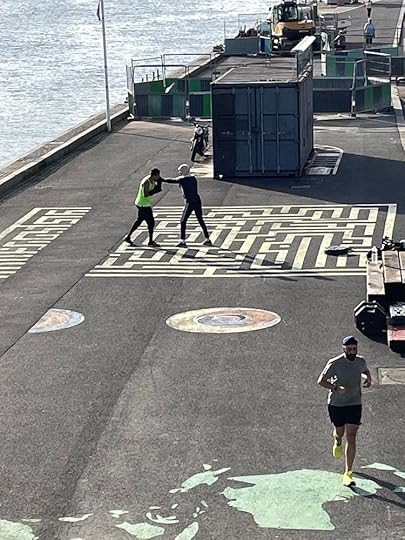
Are drivers honking more because all the construction makes them feel like caged animals or do they just need to spend more time boxing under the bridge? Are there more sirens because the police are keeping us safer or are the forces de l'ordre displaying the same feverish symptoms as the Bobos in the crowded restaurants?
Cause and effect, it seems, are playing off one another, ramping up tension, towards a frenzied crescendo. The coda promises to be anything but melodic.
 "What is going on out there?" asks a concerned canine
"What is going on out there?" asks a concerned canine(The above are admittedly not my best photos, but I hope you get the picture.)
_______________
May 21, 2022
Pluck the Moment

Friday, 20 May
Once on holiday, my friend Dana loaned me a book on Buddhism. I don’t remember the title or much about the finer points of the exposé, but as is often the case with me and books, I do remember one passage, read in a particular setting.
In this case, I was reading the book on a boat in the Caribbean with David, Dana and his husband Trevor, plus Helen, Trevor's sister and my oldest friend, and her husband Whit. Live for the moment, the passage said. All else—the past, the future—is an illusion, a distraction.
Being surrounded by blue sea and sky and people very dear to me illustrated the point, imprinted it on my mind with as much clarity as this photo of Helen and me taken during the same holiday.
 Old friends
Old friendsThe core concept is not uniquely Buddhist. The Roman poet Horace coined the term carpe diem in his Odes: "carpe diem quam minimum credula postero (pluck the day, trusting as little as possible in the next one)." The Metaphysical poet Andrew Marvell's poem "To His Coy Mistress" is all about keeping ahead of Time's wingèd chariot and having sex now, right now ("The grave's a fine and private place,/ But none, I think, do there embrace"). Robert Frost in his eponymous poem wrote of carpe diem as an "age-long theme."
Prone to dwelling on the past and fretting about the future, I am not naturally good at seizing the day. Lately I've found it even harder because the present - not to be confused with the moment - is besieging me. There is the relentless desecration in Ukraine and the repercussions beyond (billions going hungry, for example) that the world is just beginning to feel. There is the return to a pre-Covid frenzy, with apparently not a single lesson learned, despite all that talk about the calm of lockdown making us better people in a better world.
 Frantic flyers
Frantic flyersBut what's oppressing me on an hourly basis, whether in Paris or the Perche, is the weather. The month of May in France is set to be 3°C hotter than average (whatever that means anymore). It's rained almost not at all since last year. The earth is cracked and dusty.
 Ceci n'est pas le Sahara
Ceci n'est pas le SaharaSomehow the spring has managed to be glorious, but the fact that it feels like July has subverted the joy of warm, sunny days. I look at the green and imagine it will soon be brittle brown, like two recent drought-stricken summers, where even the nettles couldn't take it.
 Trying to find a green thought in a green shade
Trying to find a green thought in a green shadeDuring a morning walk with Tasha last week, the present ("too much for the senses,/ Too crowding, too confusing-/Too present to imagine," to quote Robert Frost again from "Carpe Diem") was weighing so heavily that, thrashing around in my brain for relief, I remembered the book on Buddhism...
 Aperture(s) onto the day, II, a Siddhartha moment
Aperture(s) onto the day, II, a Siddhartha moment...and forced my eyes away from the criss-crossed sky to the resplendent spring as it is today, not as I imagine it tomorrow if it doesn't rain.
Our pond, dead a year ago, now humming with life and frog song.
 Ribbiting
RibbitingThe delicate new linden leaves in the Tuileries.
 Tender moment
Tender momentThe nascent poppy in our Perche garden.
 Preparing to pop
Preparing to popI also stopped consulting the weather 10 times a day on my phone, kept focused on what was in front of my eyes, rather than what was brooding in my head, and it did help.
As if to reward my conscious efforts at seizing the day, the heavens surprised us last Wednesday evening and dumped buckets of water on the earth. The downpour worked on me like a muscle relaxant. And as if to make doubly sure that I got the message, rainbows - the incarnation of salutary ephemera - appeared on the horizon.
 Plucky moment
Plucky momentDespite this near religious experience, no conversion to Buddhism is at hand. I will never be a candidate for reincarnation, and I believe too strongly in being attentive to the past and considerate of the future in order to live a less messy present.
But after another solid rain yesterday, the sunny moment this morning feels pretty good.
 Aperture onto the day, III
Aperture onto the day, III____________________
May 7, 2022
The Celtic Thread

Friday, 6 May
When I was about 12, I had to write a family history. Don't forget, the teacher stipulated, to explain how and why your families ended up in the United States.
Of my four family prongs, three - the McKnight, Ellis and Hastings lines - could be passably traced. The Melvin side, however, was a black hole. All my Canadian father could tell me was that his forebears were poor farmers who had come from Scotland, via Northern Ireland, to Saskatchewan in the 1850s. Perhaps because Melvin was my surname, this lack of detail troubled me, and all I really remember about writing the family history is trying to fill in the gaps, and looking on with envy while my best friend Helen, whose family came over on the Mayflower, flipped through the well-documented pages of her past.
 A blur
A blurI stared at a map of Scotland and finally decided that if they’d started here, it was probably near Glasgow, the closest city to Northern Ireland (imagine my satisfaction when I first visited in the 1980s and saw signs all over for Melvin’s Garages). Then I combed a map of Northern Ireland, desperate for hints. Finding a Lake Melvin, I latched onto it as the likely point of departure.
 Seafaring
SeafaringBut the details didn't add up. Lake Melvin lies mostly in what would become the Republic of Ireland. And why had they left? The Great Famine that had caused mass Irish emigration had occurred a decade too soon, and in any case the potato blight had mostly afflicted the south and west of the country.
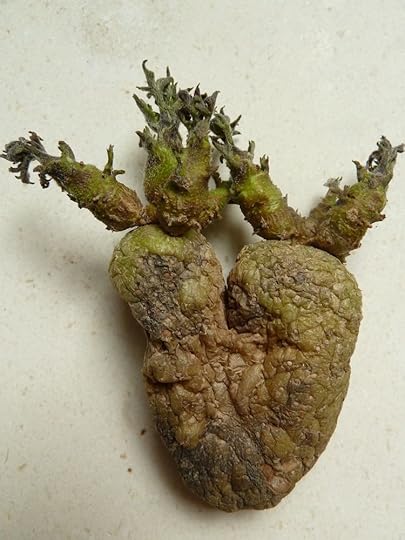 Withered spud
Withered spudThe real reason was undoubtedly abject poverty, but that wouldn't have filled up much space or been sufficiently compelling. So I fiddled with time lines and geography to create a credible story.
You could say that the resulting family history was my first work of fiction.
April was the craziest month. Starting with a trip to one rocky island - Corsica - followed by the limited-family Easter at home, it finished with a trip to London, then three days on another rocky island at the other end of Europe, Northern Ireland.
 Illumination
IlluminationFor all that map-gazing and creative writing, this was my first visit to the land of my ancestors. It was triggered by another Covid-fed case of urban exodus: last year son Christopher and his wife Kerry left London for the seaside town of Bangor, on the outskirts of Belfast, where Kerry grew up. He manages to do most of his barrister-ing from a distance, and she has started her own architecture practice, with a focus on environmentally sound building techniques. They traded their tiny three-room flat in Hackney for a sizeable house…
 All theirs
All theirs…and the congested city streets for freshly fed air.
 Emerald-ing Isle
Emerald-ing IsleFor such a small entity, Northern Ireland is a complicated place. As home to Protestants of Scottish origin (like my - and Kerry's - ancestors), it stayed part of the United Kingdom when the rest of Ireland gained independence in 1920. Until the 1998 Good Friday Agreement, sectarian violence between Protestants and Catholics made it a dangerous place to live. During The Troubles, the 30-year period that preceded the accord, over 3000 people were killed and 50,000 injured in a population of only 1.9 million. Though the two sides can still clash and Brexit has caused renewed border disputes, this detached corner of the UK is mostly peaceful now.

Our visit was certainly tranquil. We had lots of walks in the forest and along the shores.
 Skipper Christopher
Skipper ChristopherKerry's grandmother...
 The head of the family
The head of the family...mother and sister came to tea.
 Kerry, Carol and Dawn
Kerry, Carol and DawnWe'd met them and other family members at the wedding last year in Scotland. Beforehand, I'd worried how the Paris-Bangor contingents would connect. It seemed we'd had such different child- and adulthoods. What would we talk about?But right from the first handshake, conversation flowed and never lagged.
Sometime between the wedding vows and the cutting of the cake, it occurred to me that what stitched us all together - Christopher's father and even step-father are half Scottish too - was the Celtic thread. We got along instinctively, primordially, you might even say.
I imagine that my Melvin ancestors, whoever they were, would be very pleased with the life their descendent Christopher has chosen. He and Kerry are even expecting a baby; late August the next generation will be born on Northern Irish soil.
 At home
At home
April 23, 2022
Warming Up

Friday, 22 April
Officially, we're done. Ten days ago - and three years to the day since we took possession of the property - we signed off on the interior renovation work of our Perche house. Unofficially, there’s still a banister that needs to be replaced, and our furnace has just packed up, but we can now more or less settle in for the duration.
 The Signing
The SigningWe are happy with almost every aspect of the oeuvre, yet I sometimes continue to worry - and David does not disagree - that if in altering the interior so thoroughly, we have not destroyed the soul of the house. If too much beauty hasn't generated a certain hauteur, a slight chill not related to the inoperative radiators. In many ways, I felt more at home our first year sleeping above the swallows and navigating the mud to get my morning coffee. Maybe David's refrain about Tasha - “I know we bought this place for that dog” - is uncomfortably close to the truth: she feels proprietorial while we humans remain discomfited.
Then again, some post-partum blues might be endemic. My friend Elizabeth W who has just overhauled a house northeast of Paris told me last week that she and her husband Jean-Louis ask themselves the same question.
In our case, I have attributed some of my unease to the outside rawness, where terraces are still swathes of cement and the garden has only emerged in patches.
 In the right light
In the right lightWe'd intended to spend this past Easter weekend in Paris because the family gathering would be too unwieldy for displacement to the country. But once again corona germs nosed in and messed things up. Covid worries plus actual Covid cases whittled away our numbers, and the reduced group—Georgina, Amal and Mira from London, Fanny from Berlin—ended up at Deux Champs.
They were our first visitors since last summer, when a few intrepid souls slept on a mattress next to the pool table. I was reminded how humans can radiate heat, take the chill out of the walls and the floor, even when the physical heating system is not working. Within minutes of our arrival last Saturday, the place began to warm up.
 Let's be clear. This is not your house
Let's be clear. This is not your houseThe renovated space was put to good use. What is a guest room, after all, without a guest?
 A good guest
A good guestOr a large dining room without a gathering for Easter Sunday lunch...
 Heads up
Heads upThe pool, which I use religiously, sometimes compulsively (must amortise that investment!), perhaps needed a more serendipitous immersion than my dogged laps provide.
 Pool envy
Pool envySpring lured us outside, too, beyond the tracts of cement and piles of sand. David walked Amal, Fanny and Mira through the woods...
 Sylvan moment (photo by Amal)
Sylvan moment (photo by Amal)...then I took Mira dandelion picking...
 Take that Jeff Koons
Take that Jeff Koons...while Fanny brought in some of the abundant sunshine...
 Outside in
Outside inDespite the cement and sand, the area around the house is beginning to take shape. David and I watered the recently planted trees in the garden; we christened the new wooden deck out back...
 Rain or shine
Rain or shineThe weekend was also a perfect way to keep the ills of the larger world at bay - I didn't have time to finish a single depressing newspaper article. And by the time we left on Tuesday, Deux Champs had warmed up by several degrees.
 Okay, you can come back
Okay, you can come back____________________
April 9, 2022
Attempted Getaway
Friday, 8 April
Extinct civilisations are following me. Or I'm following them. First, the ancient people of Stonehenge at the British Museum exhibition, now those of Filitosa.
 Those eyes (Filitosa menhir)
Those eyes (Filitosa menhir)We stopped there while visiting friends in Corsica last week. Isabelle, who is half Corsican, and her husband Riel, invited us for a few days at her family’s house near Ajaccio. Neither of us had ever been to the island, and what a perfect getaway.
Filitosa, about an hour south of Ajaccio, was first settled around 6000BC (2000 years before Stonehenge). The menhirs and the old stone walls of its rudimentary shelters were re-discovered in 1946 and subsequently excavated.
 Found in a hedgerow
Found in a hedgerowThe site was a highlight of our trip. Tucked into a green river valley, it is a peaceful, lush place, and you can understand why Neolithic humans chose to make a home here. Unlike Stonehenge, this settlement - after various invasions and repopulations - didn't peter out until the Middle Ages.
 I know you're in there somewhere, civilisation
I know you're in there somewhere, civilisationCorsica is a small island with a long, complicated history. It has been occupied and fought over by Italians, Spaniards and French, with even the British sticking their land-grabbing nose in at times. The Republics of Pisa and Genoa ruled for long periods, and the island feels very Italian, though France ultimately took control around 1800, just before Napoleon Bonaparte, born in Ajaccio, took the mainland by storm, declared himself emperor and instituted administrative, legal and educational reforms that are still integral to the French system today. Corsicans in general are known for their strong, rebellious spirit, and independence movements have always been a feature of political life. In fact, violent protests were taking place the day we arrived, following the death in prison of Yvan Colonna, un indépendantiste convicted of murdering a civil servant in 1998.
 Two facets of Corsican pride
Two facets of Corsican prideNot surprisingly, fortifications abound. Every promontory has its tower and many towns their citadels, most dramatically in Bonifacio, where the burg is built right into the stone.

Also not surprising because geographically, Corsica is a mass of granite erupting from the sea.
 View from chez Isabelle et Riel
View from chez Isabelle et RielIt means natural resources are scarce and the soil is poor. The island lives primarily from tourists, 2.5 million of whom descend on a resident population of 350,000 during the summer months. Mainlanders often say that Corsica is great but the people "difficult." According to Isabelle, Corsicans have a different take: "We're very nice, until July 14th." Our experience substantiates their claim.
Most holiday makers go to the beaches, and a lot of the coastline has been blighted by modern construction. But drive inland and the rough terrain is undisturbed and magnificent. Thanks to unusually cold, wet weather, we got our only close-up glimpse of snow in over a year.
 Parallel latitude to Rome
Parallel latitude to RomeIsabelle and Riel took us for walks near their house...
 On the rocks
On the rocks...and on a tour of Ajaccio, with its Italianate 19th century faded charm...

...and Napoleon's ubiquitous legacy.
 Resting on his laurels
Resting on his laurelsI visited his childhood home, saw the steps of the church on which he is reputed to have been born.
 Young Napoleon's world view
Young Napoleon's world viewWe had delicious meals and drank good Corsican wine. It was great being with friends.
But getting away? The internet connection on the island is far too good (a lot better than in the Perche!). News and photos of more slaughter and devastation in Ukraine came through loud and clear. As did the release of a UN report saying it’s now or never, if we want to save the planet. There were alarming updates on the French elections, the first round of which is this Sunday. Marine Le Pen, one of the extreme right-wing candidates, creeps closer to possible victory every day.
Just after we visited Filitosa, David started feeling unwell. A bad cold, we thought, after he tested negative for Covid. Still, the worry lingered and sure enough when we got back yesterday evening he tested positive (infected, I should add, not during travels to Corsica but at a small Parisian dinner the previous Saturday). The pandemic is once again on a rampage and has finally come home.
Go where you may in the year 2022, it’s hard to get our fragility, if not our downright extinction, far from the mind.
 Human imprint
Human imprint___________________
March 12, 2022
Drawing Parallels

Friday, 11 March
It’s hard to imagine, surrounded by the pre-dawn calm here in the Perche, that last week I was staying at a hotel behind Piccadilly Circus in London where the noise of Friday night partying in the bars below kept me awake despite two sets of heavy double-glazed windows. The walls of the luxury hotel vibrated to the booming music until 3am.
 A circus
A circusLondon seemed back to its pre-pandemic frenetic self. If there are Brexit side effects, I didn't notice them. The service industry is still manned by young people with a wide range of continental European accents. Along with the booming bars, restaurants and the Tube—except when on strike, which it was two of the days we were there—are packed. Since all Covid restrictions in England were lifted on 21 February, mask-wearers in closed spaces such as myself are a dying breed.
Yet not far below the bubbling surface lurked stress and angst. The pandemic, which has plagued our bodies and minds for exactly two years now, may (or may not) be on the wane, and now there's a war. Ukraine is never far from the mind.
 Unintended solidarity
Unintended solidarityEspecially given that David and I were being put up at the hotel by the Georgian investment company (listed on the London Stock Exchange) of which he's a board member. At the opening dinner that I attended, Irakli, the chairman, stood up and welcomed us with: “Ukraine is us.” The Georgian region of South Ossetia, you may recall, was invaded by the Russians in 2008 and has been occupied by them ever since.
I sat next to his wife Keti. She said: “We grew up with war and when peace finally came, we worked really, really hard to make a success of Georgia, so that our children would not have to grow up as we did. And here we are. If he wins in Ukraine, Putin will come for us again, and our children too will grow up like us, in strife. We are a small country. Who will help us?”
 Mary's hand over baby Jesus, detail from The Virgin of the Rocks
Mary's hand over baby Jesus, detail from The Virgin of the RocksSeveral museums are within walking distance from Piccadilly Circus, and I had a culturally enriching week. For the first time in many years, I ambled through the permanent collection of The National Gallery and revelled in the many masterpieces, such as the above Leonardo painting. I went to The World of Stonehenge at the British Museum, which tells the story not just of the sun worshippers and their circular sarsen stone monument on the Salisbury Plain but more broadly, of Europe between 4000 and 1000 BC. Relics reveal that extensive trade and travel during that period, even without written language, make it something of an avatar for the European Union.
 Move over, Picasso (The Knowth macehead, Neotlithic Age, Ireland)
Move over, Picasso (The Knowth macehead, Neotlithic Age, Ireland)It ended when brutal wars broke out around 1250 BC.
 War spoils (near the River Tollense, Germany)
War spoils (near the River Tollense, Germany)The next day I went to the Francis Bacon: Man and Beast show at The Royal Academy. It highlights Bacon’s fascination with animals and displays works, according to the website, “reminding us that our primal instincts lie just below the surface." Bacon himself, who lived through both World Wars of the 20th century, put it this way: "We are meat, we are all potential carcasses." Parallels are not difficult to draw.
 Bones (woman and baby) and Bacon (Study for The Nurse in the Film Battleship Potemkin)
Bones (woman and baby) and Bacon (Study for The Nurse in the Film Battleship Potemkin)Most days, late afternoon, I made my way to West Hampstead to care for my grand-daughter Mira. She is an unusually easygoing and cheery child...
 Two teeth
Two teethHer first birthday was last Sunday, March 6th.
 Looking ahead
Looking aheadMira lives in London, not Georgia or Ukraine, but the distance is not great. There is still reason to worry about the world that awaits her. No one knows where this war will lead, but it's already way too late for a best-case scenario. The tragedy - whether or not it was avoidable, as many think it was - is being directed by a man who values no human life but his own, who is threatening chemical weapons (Syria has already demonstrated that a century after World War I, they are not a relic of the past) and whose cold, twitchy, possibly irrational, fingers have access to the nuclear button.
Reading about the devastation every morning and watching it on television every night are exercises in desperation and despair, but I feel a moral duty to witness some of the horror at least virtually. What tears at my heart most are the bundled-up children, protected by their parents from the cold of winter but not from the anguish of displacement and the indiscriminate bombardments.
 Parallels are not difficult to draw
Parallels are not difficult to drawFrancis Bacon was right: we are animals. We sense more than what our conscious minds process. And don't we all - whether in London, Paris or the Perche, while we continue to work, travel or party on a Friday night - feel it, a rumbling, gut fear of what's to come?
 Cloud over the Perche
Cloud over the Perche
February 26, 2022
Where Are We Heading?

Friday, 25 February
There I go again, writing too soon.
No sooner had I sung the praises of February than Storm Eunice battered northern Europe with gusts of wind up to almost 200 km/h/120mph. Close to 20 people and countless trees were killed. It tore a large hole in London’s Millennium Dome, snapped a church spire and caused 9m/30ft waves to pound coasts. The planet’s rage was on full display.
A few days later, on the other side of Europe, so too was the Russian president's. Vladimir Putin, ensconced in a decor that looked borrowed from the East German Stasi Police headquarters, now a museum...
 Just add the flags (photo by Tobias Nordhausen)
Just add the flags (photo by Tobias Nordhausen)...gave a revanchist rant questioning Ukraine's right to exist as a state, demanding its fealty to Russia. He clearly had imperial restoration in mind.

Early yesterday morning I switched my phone off sleep mode and ping came the notification that the Russian bombs were falling, their tanks advancing on Ukraine.

It seemed almost indecent to carry on as usual while a neighbour was being stormed. But I went through the motions, staring at my computer, walking the dog, sitting back down at my desk and staring some more. At noon I went running in the Tuileries, where normal life also appeared to carry on. The construction of temporary buildings for yet another Fashion Week continued to intrude upon and disfigure the gardens. Minus the locked-down Chinese, tourists are back, almost en masse. The apparent insouciance of others clouded my usually mood-enhancing run.
 "Get off of me!" cried the fountain.
"Get off of me!" cried the fountain. But I may have misjudged my fellow humans because later, my piano teacher Françoise replied to my Ca va ? with “No, it’s horrible, what’s happening in Ukraine.” Ditto Théo, when he brought Tasha back from her walk in the woods with the pack. Ditto Julia, my former German teacher, on our FaceTime catch-up call. Even my usually laser-focused husband told me he’d had trouble settling down to work. I might be imagining it but the dog too looked distressed.
 It looks bad, really bad
It looks bad, really badToday I was planning to write about a visit I made this week to the Romantic painter Eugène Delacroix's studio, one of many charming small museums in the city.
 Sketch for Liberty Leads the People
Sketch for Liberty Leads the PeopleBut how can I write about idle, arty outings when a geopolitical earthquake has just occurred?
 The new world order?
The new world order?A couple weeks ago I read a chilling article by Gideon Rachman in The Financial Times. He wrote that analysts in the West have tended to consider the former KGB agent as Putin the Rational. Ruthless and calculating, yes, but reasoned. Now, he said, some had come to believe that after 20 years in power and almost three of Covid, during which a paranoid Putin closed himself off from the world almost entirely, we may have a 'Vlad the Mad'. Certainly what's unfolding before us today argues for the latter interpretation. Who knows how far a man who's lost his grip on logic might go. It's terrifying.
Any problem of a global order can leave you feeling helpless. But at least with climate change, say, you can go recycle something or cancel your plans to fly to Bali. What can you do about a war?

 Starck-raving mad
Starck-raving madIn this morning's Le Parisien, I learned not only that there is a Ukrainian church in Paris but that it's practically next door. Over the last 40 years, I've ridden by Saint-Volodymyr-le-Grand at the corner of the rue des Saints-Pères and the boulevard Saint-Germain hundreds of times without taking note.
 Tucked away, fitting in
Tucked away, fitting inThis afternoon, just to do something, I got on my bike. Outside a man was giving an interview; a few people looked on. Inside others dotted the humble pews.

In a gesture of solidarity, I lit a candle, added it to the others, but I can't say it made me feel any better or inspired any hope.
 Red lights not working
Red lights not workingOne thing is certain: February 2022 has lost its glow.



